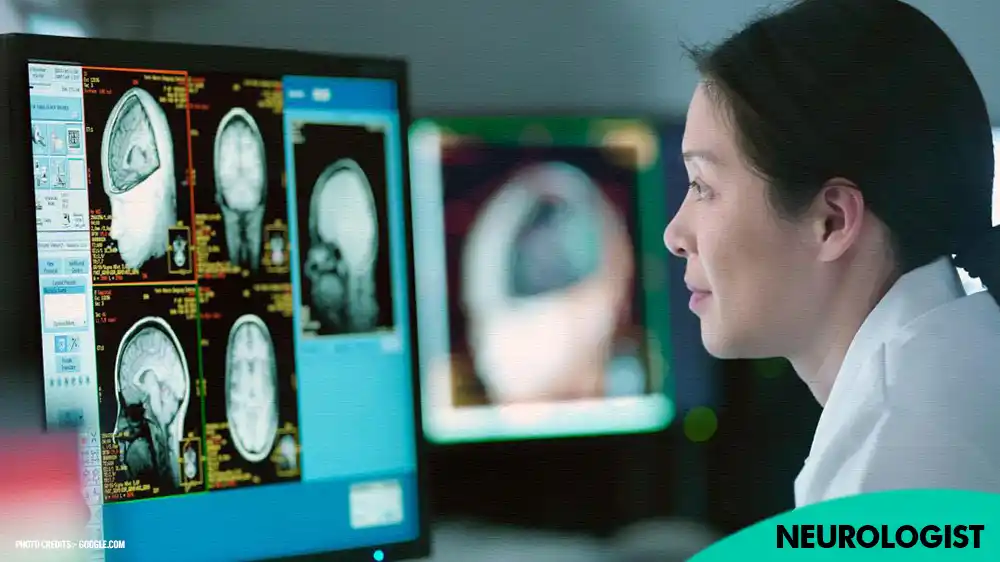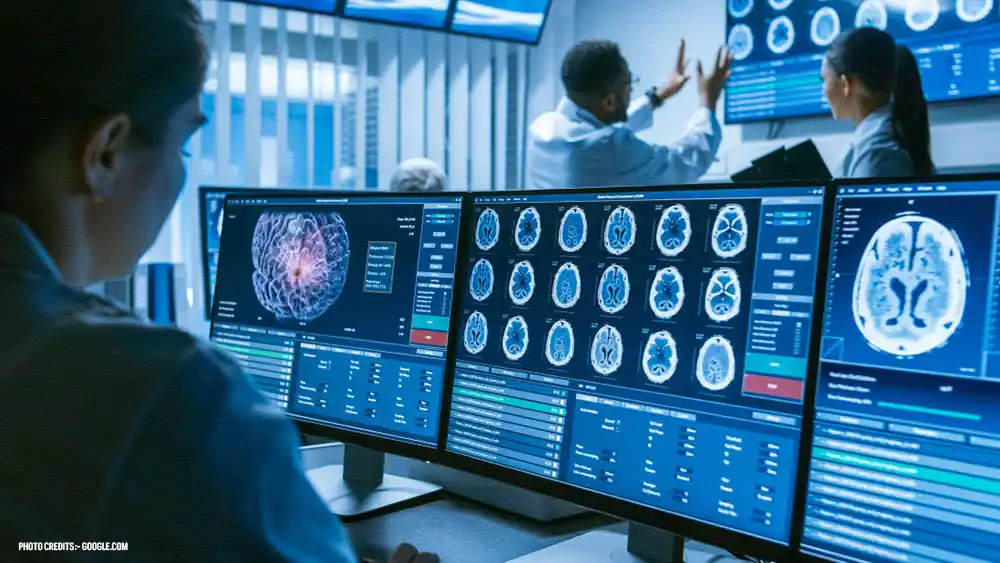
NEUROSCIENCE
How to Become a Neurologist? A Complete Guide
-
Rahul Priydarss
Become a Neurologist: Your Complete Guide. Discover the world of neurology and how to embark on a fulfilling career. Learn about the role of neurologists, educational requirements, specialization options, and top postgraduate colleges. Dive into the essential skills and qualities needed for success in neurology. Explore the diverse work environments available for neurologists and find out about the top neurocare centers in New York. Start your journey toward becoming a neurologist today!
Introduction to Neurology:
Neurology is the branch of medicine concerned with disorders of the nervous system, including the brain, spinal cord, nerves, and muscles. Neurologists diagnose and treat a wide range of conditions, from headaches and seizures to neurodegenerative diseases like Alzheimer’s and Parkinson’s.

Table of Contents
What is Neurology:
Neurology is a fascinating field of medicine that deals with the study and treatment of disorders of the nervous system. From diagnosing conditions like epilepsy and multiple sclerosis to managing stroke rehabilitation, neurologists play a crucial role in improving the lives of patients with neurological disorders. If you’re passionate about the brain, and nervous system, and helping people, pursuing a career as a neurologist might be the right path for you.
Definition of Neurology: Neurology encompasses various subspecialties, such as pediatric neurology, neuro-oncology, and neurophysiology. It involves both medical and surgical approaches to treating neurological disorders.
Role of Neurologists in Healthcare: Neurologists play a pivotal role in the healthcare landscape, serving as specialists in the diagnosis and treatment of disorders affecting the nervous system. Their expertise is indispensable in addressing a wide range of neurological conditions, from common ailments like headaches and neuropathies to complex disorders such as Parkinson’s disease, multiple sclerosis, and epilepsy.
Educational Requirements for Neurologists:
Becoming a neurologist requires a comprehensive educational journey that encompasses undergraduate studies, medical school, residency training, and optional fellowship programs. Let’s delve into the specific educational requirements for aspiring neurologists.
1. Undergraduate Education: The journey to becoming a neurologist typically begins with earning a bachelor’s degree from an accredited university or college. While there is no specific undergraduate major required for admission to medical school, aspiring neurologists often pursue degrees in biology, chemistry, biochemistry, or neuroscience to build a strong foundation in the sciences. During their undergraduate studies, students should focus on coursework that emphasizes biology, chemistry, physics, and mathematics to prepare for the rigors of medical school.
2. Medical School: After completing undergraduate studies, the next step is to attend medical school. Admission to medical school is highly competitive, and candidates must perform well on the Medical College Admission Test (MCAT) and demonstrate a strong academic record, extracurricular activities, and letters of recommendation. Medical school typically takes four years to complete and consists of classroom instruction, laboratory work, and clinical rotations in various medical specialties.
During medical school, students receive a broad-based education in the biomedical sciences, including anatomy, physiology, pharmacology, pathology, and microbiology. They also gain clinical experience through rotations in different medical specialties, including internal medicine, surgery, pediatrics, obstetrics and gynecology, psychiatry, and neurology.
3. Residency Training in Neurology: After completing medical school, aspiring neurologists must complete a residency program in neurology, which typically lasts four years. Neurology residency programs provide specialized training in the diagnosis and treatment of neurological disorders under the supervision of experienced neurologists. Residents rotate through various clinical settings, including hospitals, outpatient clinics, and research laboratories, gaining hands-on experience in patient care, medical procedures, and research.
During residency, neurology residents develop expertise in evaluating and managing a wide range of neurological conditions, including stroke, epilepsy, Parkinson’s disease, multiple sclerosis, Alzheimer’s disease, neuromuscular disorders, and headache disorders. They also learn to interpret diagnostic tests, such as electroencephalography (EEG), electromyography (EMG), nerve conduction studies, magnetic resonance imaging (MRI), and computed tomography (CT) scans.
4. Board Certification: After completing residency training, neurologists have the option to become board-certified by the American Board of Psychiatry and Neurology (ABPN). Board certification demonstrates a physician’s expertise and commitment to the highest standards of patient care and requires passing a rigorous examination covering all aspects of neurology. Maintaining board certification also requires ongoing continuing medical education and periodic re-examination to stay current with advancements in the field.
5. Optional Fellowship Training: In addition to board certification in general neurology, many neurologists choose to pursue fellowship training in neurological subspecialties to further specialize their practice. Subspecialties include neurocritical care, neuro-oncology, neuromuscular medicine, pediatric neurology, movement disorders, epilepsy, headache medicine, and neuroimmunology, among others. Fellowship training typically lasts one to two years and provides in-depth, hands-on experience in a specific area of neurology.
Top 5 Postgraduate Colleges for Neurology:
Choosing the right postgraduate program in neurology is crucial for aspiring neurologists to receive comprehensive training, gain clinical experience, and develop expertise in the field. Here are five prestigious postgraduate colleges known for their excellence in neurology education and training.
1. Johns Hopkins University School of Medicine (Baltimore, Maryland, USA): Johns Hopkins University School of Medicine is renowned for its leadership in medical education and research, including neurology. The Department of Neurology offers a highly competitive residency program that provides comprehensive training in all aspects of clinical neurology, including acute neurological care, neurocritical care, stroke, epilepsy, movement disorders, neuromuscular diseases, and neuro-oncology. Residents have access to state-of-the-art facilities, cutting-edge research opportunities, and world-class faculty mentors.
2. Harvard Medical School (Boston, Massachusetts, USA): Harvard Medical School is one of the oldest and most prestigious medical schools in the world, with a strong reputation for excellence in neurology education and research. The Department of Neurology at Harvard-affiliated hospitals, such as Massachusetts General Hospital and Brigham and Women’s Hospital, offers a rigorous residency program that emphasizes clinical excellence, scientific inquiry, and compassionate patient care. Residents benefit from exposure to a diverse patient population, innovative treatment modalities, and collaborative research initiatives.
3. Mayo Clinic College of Medicine and Science (Rochester, Minnesota, USA): Mayo Clinic College of Medicine and Science is renowned for its integrated clinical practice, education, and research model, including neurology. The Department of Neurology offers a comprehensive residency program that combines hands-on clinical experience, didactic education, and research opportunities across various subspecialties of neurology, such as neuro-oncology, neuroimmunology, neurogenetics, and neurorehabilitation. Residents receive personalized mentorship from world-class faculty and benefit from Mayo Clinic’s patient-centered approach to healthcare.
4. University College London (London, United Kingdom): University College London (UCL) is a leading research university with a strong reputation for its contributions to neuroscience and neurology. The UCL Institute of Neurology offers a competitive residency program that provides residents with exposure to cutting-edge research, clinical trials, and multidisciplinary care in neurological disorders. Residents have the opportunity to work alongside renowned neurologists, neuroscientists, and clinicians at UCL-affiliated hospitals, such as the National Hospital for Neurology and Neurosurgery.
5. University of California, San Francisco (San Francisco, California, USA): The University of California, San Francisco (UCSF) is a premier academic institution known for its excellence in healthcare, education, and research, including neurology. The UCSF Department of Neurology offers a dynamic residency program that emphasizes clinical innovation, translational research, and community engagement in neurological care. Residents benefit from exposure to a diverse patient population, cutting-edge technologies, and collaborative partnerships with leading neuroscience institutes and industry partners in the San Francisco Bay Area.

Specialization Options in Neurology:
Neurology is a diverse and rapidly evolving field that offers a wide range of specialization options for neurologists seeking to focus their practice on specific areas of interest or expertise. These subspecialties allow neurologists to deepen their knowledge, refine their skills, and provide specialized care to patients with complex neurological conditions. Let’s explore some of the specialization options available in neurology.
1. Neurocritical Care: Neurocritical care is a subspecialty of neurology that focuses on the management of critically ill patients with neurological disorders, such as traumatic brain injury, subarachnoid hemorrhage, ischemic stroke, intracerebral hemorrhage, and status epilepticus. Neurocritical care specialists are trained to provide advanced monitoring, aggressive medical interventions, and multidisciplinary care in intensive care unit (ICU) settings to optimize outcomes and prevent secondary brain injury.
2. Neuro-Oncology: Neuro-oncology is a subspecialty of neurology that deals with the diagnosis and treatment of brain tumors and neurological complications of cancer. Neuro-oncologists work closely with oncologists, neurosurgeons, radiation oncologists, and other specialists to develop comprehensive treatment plans tailored to each patient’s needs, which may include surgery, chemotherapy, radiation therapy, immunotherapy, and supportive care.
3. Neuromuscular Medicine: Neuromuscular medicine is a subspecialty of neurology that focuses on the diagnosis and management of disorders affecting the peripheral nervous system, including muscles, nerves, and neuromuscular junctions. Neuromuscular specialists evaluate and treat a variety of conditions, such as peripheral neuropathy, myasthenia gravis, muscular dystrophy, amyotrophic lateral sclerosis (ALS), and peripheral nerve injuries, using a combination of clinical examination, electrophysiological testing, and genetic studies.
4. Pediatric Neurology: Pediatric neurology is a subspecialty of neurology that focuses on the diagnosis and treatment of neurological disorders in children, from infancy through adolescence. Pediatric neurologists are trained to evaluate and manage a wide range of conditions, including developmental delay, epilepsy, cerebral palsy, autism spectrum disorder, neurogenetic syndromes, and pediatric stroke, providing compassionate care to young patients and their families.
5. Movement Disorders: Movement disorders is a subspecialty of neurology that focuses on the diagnosis and treatment of conditions characterized by abnormal movements, such as Parkinson’s disease, essential tremor, dystonia, Huntington’s disease, and Tourette syndrome. Movement disorder specialists are skilled in the use of medications, botulinum toxin injections, deep brain stimulation (DBS) surgery, and other advanced therapies to alleviate symptoms and improve the quality of life for patients with movement disorders.
6. Epilepsy: Epilepsy is a subspecialty of neurology that focuses on the diagnosis and treatment of seizure disorders, including epilepsy and epileptic syndromes. Epileptologists are trained to evaluate and manage patients with recurrent seizures, conducting comprehensive diagnostic evaluations, interpreting electroencephalography (EEG) studies, and prescribing antiepileptic medications, ketogenic diet therapy, and surgical interventions, such as epilepsy surgery and vagus nerve stimulation (VNS).
7. Headache Medicine: Headache medicine is a subspecialty of neurology that focuses on the diagnosis and treatment of headache disorders, such as migraine, tension-type headache, cluster headache, and medication-overuse headache. Headache specialists employ a multidisciplinary approach to manage headaches, including lifestyle modifications, behavioral therapy, preventive medications, acute treatments, and interventional procedures, to reduce the frequency and severity of headaches and improve patients’ quality of life.
Fellowship Programs in Neurology:
After completing residency training in neurology, many physicians choose to further specialize their practice and enhance their expertise by pursuing fellowship programs. These post-residency training opportunities provide neurologists with advanced clinical and research experiences in specific subspecialties of neurology. Let’s delve into some of the fellowship programs available in neurology. you must do the fellowship programs which are explained in the specialization options.
Skills and Qualities for Neurologists:
Neurology is a complex and demanding field of medicine that requires neurologists to possess a diverse set of skills and qualities to effectively diagnose, treat, and manage neurological disorders. Here are some of the key skills and qualities needed in neurology.
1. Clinical Reasoning and Problem-Solving Skills: Neurologists must have strong clinical reasoning and problem-solving skills to evaluate patients with a wide range of neurological symptoms and formulate accurate diagnoses and treatment plans. They must be adept at synthesizing clinical data, interpreting diagnostic tests, and integrating scientific evidence to guide clinical decision-making and optimize patient outcomes.
2. Diagnostic Proficiency: Neurologists must have excellent diagnostic proficiency to accurately identify and classify neurological conditions based on clinical presentations, neurological examinations, and ancillary tests, such as neuroimaging studies, electrodiagnostic tests, and laboratory investigations. They must be skilled in recognizing subtle neurological signs and symptoms and differentiating between similar neurological disorders to provide precise diagnoses and targeted interventions.
3. Communication and Interpersonal Skills: Effective communication and interpersonal skills are essential for neurologists to establish rapport with patients, families, and interdisciplinary healthcare teams and facilitate collaborative decision-making and patient-centered care. Neurologists must be able to convey complex medical information in understandable terms, demonstrate empathy and compassion, and actively listen to patients’ concerns and preferences to build trusting therapeutic relationships.
4. Clinical Examination Techniques: Neurologists must be proficient in performing comprehensive neurological examinations to assess cranial nerves, motor function, sensory function, coordination, reflexes, and mental status. They must be skilled in eliciting and interpreting subtle neurological signs and abnormalities, such as muscle weakness, sensory deficits, gait disturbances, and cognitive impairments, to localize lesions and determine the underlying neurological pathology.
5. Procedural Skills: Neurologists must possess procedural skills to perform a variety of diagnostic and therapeutic procedures, such as lumbar puncture, electromyography (EMG), nerve conduction studies (NCS), electroencephalography (EEG), botulinum toxin injections, and deep brain stimulation (DBS) surgery. They must be proficient in performing these procedures safely, accurately, and efficiently, while minimizing patient discomfort and risk of complications.
6. Critical Thinking and Decision-Making Abilities: Neurologists must have strong critical thinking and decision-making abilities to evaluate complex clinical scenarios, weigh the risks and benefits of various treatment options, and make evidence-based decisions that align with patients’ goals, preferences, and values. They must be able to adapt their clinical approach to individual patient needs, respond effectively to emergent situations, and navigate uncertainty and ambiguity in clinical practice.
7. Lifelong Learning and Professional Development: Neurologists must be committed to lifelong learning and professional development to stay current with advancements in the field of neurology and maintain their clinical competence and expertise. They must actively engage in continuing medical education (CME) activities, participate in clinical research and scholarly activities, and seek opportunities for mentorship, feedback, and self-reflection to enhance their knowledge, skills, and clinical practice.
The Work Environment for Neurologists:
Neurologists work in diverse clinical settings, academic institutions, research laboratories, and healthcare organizations, providing comprehensive care to patients with neurological disorders and contributing to the advancement of the field of neurology. Let’s explore the various aspects of the work environment for neurologists.
1. Hospitals and Medical Centers: Many neurologists work in hospitals and medical centers, where they provide inpatient and outpatient neurological care to patients with acute and chronic neurological conditions. In hospital settings, neurologists may collaborate with multidisciplinary teams of healthcare professionals, including neurosurgeons, neurointensivists, neurohospitalists, nurses, therapists, and social workers, to deliver comprehensive care and coordinate treatment plans for complex neurological disorders.
2. Outpatient Clinics: Neurologists also work in outpatient clinics, where they evaluate and manage patients with neurological symptoms and disorders in ambulatory settings. In outpatient clinics, neurologists conduct comprehensive neurological examinations, perform diagnostic tests, such as electroencephalography (EEG), electromyography (EMG), and nerve conduction studies (NCS), and provide ongoing follow-up care and treatment for patients with chronic neurological conditions, such as epilepsy, multiple sclerosis, Parkinson’s disease, and migraine headaches.
3. Academic Institutions: Many neurologists hold academic appointments at universities and medical schools, where they engage in teaching, research, and scholarly activities alongside their clinical practice. In academic settings, neurologists teach medical students, residents, and fellows about neuroanatomy, neurophysiology, neuropharmacology, and clinical neurology, supervise research projects, and contribute to the scientific literature through clinical trials, translational research, and basic science investigations.
4. Research Laboratories: Some neurologists work in research laboratories, where they conduct basic science and clinical research to advance our understanding of neurological disorders and develop novel treatments and therapies. In research settings, neurologists may investigate the molecular, cellular, and genetic mechanisms underlying neurological diseases, explore new diagnostic and therapeutic approaches, and collaborate with scientists from other disciplines, such as neuroscience, pharmacology, genetics, and bioinformatics.
5. Telemedicine and Telehealth: With the advent of telemedicine and telehealth technologies, neurologists have the opportunity to provide remote consultations, diagnostic evaluations, and follow-up care to patients with neurological disorders, regardless of geographic location. Telemedicine allows neurologists to reach underserved populations, improve access to specialty care, and deliver timely interventions for acute neurological emergencies, such as stroke while leveraging digital platforms, videoconferencing, and telemonitoring tools.
6. Private Practice: Some neurologists choose to establish or join private practice groups, where they provide personalized neurological care to patients in community-based settings. In private practice, neurologists may focus on specific subspecialties, such as headache medicine, neuromuscular disorders, or movement disorders, and offer a range of services, including diagnostic evaluations, treatment interventions, second opinions, and counseling for patients and their families.
Top 5 Neurocare Centers In New York:
It’s difficult to definitively say what the top 5 neuro care centers in New York are since there are many factors to consider, such as specific needs and insurance coverage. However, here are a few highly-rated facilities that offer a wide range of neurological services.
Complete Neurological Care – Midtown: This center has a 4.4-star rating on Google with nearly 300 reviews. They have multiple locations throughout the city and offer a variety of services, including pain management, epilepsy treatment, and general neurology.
NY NeuroCare Medical Services, PLLC: This clinic has a 4.3-star rating on Google with a smaller number of reviews (4). They offer general neurology services.
Mount Sinai Tisch MS Neuroscience Institute: Part of the Mount Sinai Health System, this institute offers a comprehensive range of neurological care, including surgery, research, and patient education.
Weill Cornell Medicine Brain and Spine Center: This center at Weill Cornell Medicine offers a full spectrum of neurological care, from diagnosis and treatment to rehabilitation and support services.
Columbia University Irving Medical Center Department of Neurology: The neurology department at Columbia University Irving Medical Center provides a variety of neurological services, including epilepsy care, movement disorders, and neurodegenerative diseases.
FAQs about Neurologist:
A1: Neurology is a branch of medicine focused on diagnosing and treating disorders of the nervous system, including the brain, spinal cord, nerves, and muscles. Neurologists specialize in evaluating and managing conditions such as epilepsy, stroke, Parkinson’s disease, and Alzheimer’s disease.
A2: Becoming a neurologist requires completing undergraduate studies, attending medical school, completing a residency in neurology, and obtaining board certification. This educational journey typically takes around 12 years after high school.
A3: Aspiring neurologists should possess strong clinical reasoning, diagnostic proficiency, communication skills, and critical thinking abilities. They should also demonstrate empathy, adaptability, and a commitment to lifelong learning.
A4: Neurology offers various subspecialties, including neurocritical care, neuro-oncology, neuromuscular medicine, pediatric neurology, movement disorders, epilepsy, and headache medicine. These subspecialties allow neurologists to focus on specific areas of interest or expertise.
A5: To increase your chances of matching into a neurology residency program, focus on excelling in medical school, gaining relevant clinical experience, participating in research, obtaining strong letters of recommendation, and performing well on standardized exams like the USMLE.
-Please remember, to always consult with healthcare professionals or Doctors for personalized advice related to medical conditions.
Conclusion:
In conclusion, becoming a neurologist is a rewarding journey that requires dedication, perseverance, and a genuine passion for helping others. By following the comprehensive guide outlined here, aspiring neurologists can navigate the educational requirements, specialization options, and career opportunities in this dynamic field of medicine. With the right skills, training, and commitment to lifelong learning, neurologists can make a meaningful impact on the lives of patients and contribute to advancing our understanding and treatment of neurological disorders. Embark on this fulfilling career path and unlock the potential to make a difference in the world of neurology.




